That First Taste of Free Air
You feel it the moment you step out of the airport, and are busy cruising down the highway to your destination. It’s not just in the traffic that crosses double yellow lines or ignores stop lights if the road is clear. It’s in the vehicles themselves; sometimes crowded to the maximum, with luggage tied to the top, sometimes appearing to be tied up just to keep the vehicle together.
Maybe you’ll notice a truck filled with workers or one that has a hammock swinging lazily in back, with the occupant blissfully taking in the sunlight. The buses lumber by, so packed, passengers cling to the door frames. If you brave one of these second-class, local buses, you might feel you’re in a barnyard. Chickens squawk from crates packed under the seat, and there might even be a goat or a lamb that somebody’s transporting to the market.
It’s a reminder of how America was before seat belt laws and strict traffic regulations, before traffic citations became profitable. If you have someplace to go, nobody cares about the means you use of getting there.
Slowing Down
Outside the city hubs, vehicles are relatively sparse. The most common mode of transportation is by bus. Pedestrians, farmers pushing along a few cows, wash women with piles of clothing on their heads are not an uncommon sight along rural roads.
This daily life, so unencumbered by appointments and punching a clock, begins to seep into you. You find yourself hurrying less and relaxing more, spending time doing those things you’ve always dreamed of doing, but never found the time or the opportunity. You begin to think about your new found freedom, that began with a freedom from worry.
The Economic Race
It seems odd that so many of the citizens who are immigrating from the United States into Central America are doing so out of a longing for freedom, but sadly enough, as a country founded on the liberties of all people, it has become a system of rules and regulations designed to give advantages and privileges to some, while penalizing and suppressing the many.
That hectic pace felt so distinctly in urbanized America is the desperate measure of a people determined to keep their heads above water. The American dream for many married couples, of a fine little home and a two-car garage, can’t possibly be realized unless both are working and they take out a twenty year loan. Those over sixty who had been planning to enjoy the benefits of their golden years, find their retirement or social security checks just aren’t enough, and take on part-time jobs for which they are over-qualified, but too financially distressed to refuse.
Then there are the young singles, working hard and studying for a degree that may not be very helpful for finding work. Jobs that had once taken an associate’s degree, now take a master’s, and debt-strapped students wallow in student loans.
When Life Becomes Stifling
The opportunities once offered in America don’t seem so plentiful anymore. Innovation, imaginative ideas, are either swallowed in a maelstrom of bureaucratic paperwork, or take a long time to mature, making the process uncomfortable for non-entrepreneurial types. For every proposal, no matter how universally beneficial, there is opposition. The red tape ticks away at finances, valuable time, and eventually, motivation.
America can barely breathe. You cannot even build a porch for your house, on your own property, without permits and inspectors. In some communities, there are agreed-upon house colors, and regulations concerning what you may have in your yard. You may discover you don’t even have a right to grow a garden instead of a water wasting lawn. The attempts to create a uniform standard of living within specified zones has swept away the concept that one’s home is one’s castle. The spirit of these rules makes sense, they are for the benefit of environment, home prices, and people’s safety, but in today’s world the rules are wielded like weapons against creativity and individuality.
You’re as Free as Your Neighbor
The migration into Central America is made up of people who have grown weary with asking for permission. The safety net hovering over American social affairs feels more like an entrapment net, encumbering freedom of travel with security checks and invasive techniques, such as airport scans and cell phone tracking.
Homes and small businesses are regulated with so many expensive codes and mandatory health care. The U.S. constituents are strapped with so many liability laws, they become nervous about allowing the neighbor kids to come over and play on a trampoline.
Coping with Drawbacks
The expats have had to make some adjustments. In an area where there is little to no regulation, cities can turn ugly fast, while everybody builds whatever they want and a smorgasbord of buildings go up. If your neighbor wants to begin his day at six in the morning, banging away at his new addition, and you want to sleep until seven, it’s best to just roll over with your pillow.
While the cities offer the modern conveniences, the farther away you are from them, the fewer commodities, such as super consistent electricity, paved roads, libraries, and U.S. foods you’ll find. You may find a lower quality in many of the common household tools, such as for gardening or carpentry.
There is a role reversal once you are an expat. You are suddenly a minority in a foreign country. You’ll feel subjected to the same type of scrutiny as given any minority. You may get pulled over just because you look like a gringo. If you are aspiring to become a global citizen, this actually aids in perspective. Outside the dynamics of the western world, you are a minority.
You Still Feel Freer than You Did in the United States
There is an enormous amount of satisfaction in living and breathing freely, without the rigid controls over an over-regulated government. It’s a learning experience in getting along with others of different cultural backgrounds and lifestyles. It allows you ample opportunities for evaluating your own beliefs. It teaches you resourcefulness with the tools and materials on hand.
For the health-oriented, it becomes advantageous to acquire a taste for the native foods. This isn’t too hard, considering the volume of fresh tropical fruits and delicious sea fare that abound in Central America’s market. Not only do you benefit from the organics, but buying local is cheaper than the shipped-in U.S. market.
The Growing Family of Expats
Families make up a vital force in the expat community. Sometimes, they come down for a year to absorb the cultural setting or as a reprieve from restrictive American life. Sometimes, they arrive with more permanent intentions in mind.
The challenge for these families, if they remain within a residential area removed from the major cities, is finding good schools. But like pioneers, they draw upon their own resourcefulness, enjoying the opportunity to educate their children in the manner they feel is best, maybe even starting their own school.
As We Look Forward
It is, in every sense, a type of pioneering. The expats that settle in Central America don’t hate their country. They hate the limits placed on their abilities to make conscious choices. They no longer wish to be treated like a kid, they trust their own ability to decide what is best.
They know this freedom comes with a price. They are moving into a different culture with different customs. They must depend on their own abilities to cope with change, to problem solve, to develop good relationships with others, but it’s all part of the excitement, the adventure. These are the stimuli for growth and development, the fundamentals of increased awareness, and the reward is an evolving society, ready to explore the new boundaries of individual rights and harmonious communities.

Sal Falko
In recent years Central America has received an influx of North Americans investing in local business. Countries like Belize, Nicaragua, Costa Rica, and Panama have become increasingly popular places for baby boomers to retire. Why has this generation chosen to settle offshore?
Quality of Life
With warm weather year round and stunning beaches, lakes, volcanoes, and hillside, Central America has an appealing climate. Many small jungle beach towns are popular among tourists, making foreign investment a lucrative possibility. For those looking for city comforts, most cities lie in close proximity to incredible wilderness. Granada, Nicaragua sits near a stunning lake and volcano and also has great restaurants, nightlife, and culture. Plentiful fruit and vegetables and many outdoor activities also make healthy living not only possible, but easy.
Lower Cost of Living
Even more expensive Central American countries like Costa Rica offer a lower cost of living than the United States. It is very possible for individuals to live comfortably on less than $1,000 per month. Nearby Panama is even more affordable and food, entertainment, and lodging in Nicaragua is half the cost of Costa Rica. This low cost of living is incredibly appealing to baby boomers looking to retire and live abroad without sacrificing luxuries like dining out, maid service, and travel.
Proximity to the U.S.
Central America is an inexpensive, quick flight from the United States, making investment or a permanent move less daunting. Individuals are still able to visit their families or live part time in each place.
Return on Investment
While some investors plan to live and settle in Central America, others buy property simply to earn income from their investment. Property costs are low and vacation rentals can yield a good salary, making these foreign investments a popular choice for those looking to save for retirement.
Honduras 3 Count, where we bring you 3 Honduras stories that you shouldn’t miss.
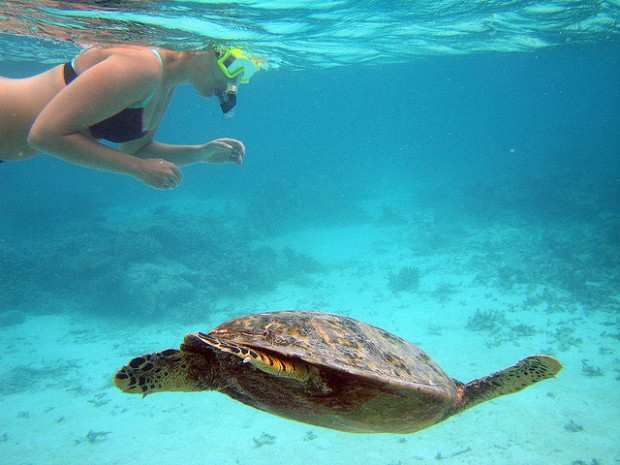
Photo: Christian Steen
1. Wow! 130 Spots to Snorkel in Roatan
Roatan is surrounded by a barrier reef that lies approximately 300 feet from the shoreline and that brings you a wealth of snorkeling spots, more than 130. These amazing spots, along with a maze of underwater sunken treasures, make the island a diver’s or snorkeler’s paradise.
2. What Kite Surfers Can Teach Us About Honduran Culture
A small island named Guanaja in Honduras features near perfect waves and breezes…ideal for kite surfing. This little island, and its inhabitants, are completely disconnected from the rest of Honduras, and in some ways, the rest of the world. Here, tourism is still in its infancy, which made it the perfect place for a group of kite surfers to gear up, tackle the waves, and discover Honduran culture along the way.
3. Finding the Hidden Mountain: Cerro Las Minas
Cerro Las Minas is the highest mountain in Honduras and relatively unknown. Two hikers from Distan Peak take on the challenge of finding Cerro Las Minas and reaching its peak. They went in expecting a jungle experience, but found it was more like a long walk in the park.
Roatan, one of the Bay Islands in Honduras, just may be the world’s best island for expats.
1. Roatan is near-perfect island living.
Roatan’s growing expat community is now supporting many modern conveniences along with almost everything you can buy at home, and some that you can’t, like a never-ending vista.

Photo Credit: J Hound
2. Here, you can take up a new hobby.
The water is clear and warm and the beaches are white-sand. The world’s second largest coral reef lies just offshore, making the Bay Islands a favorite with divers.
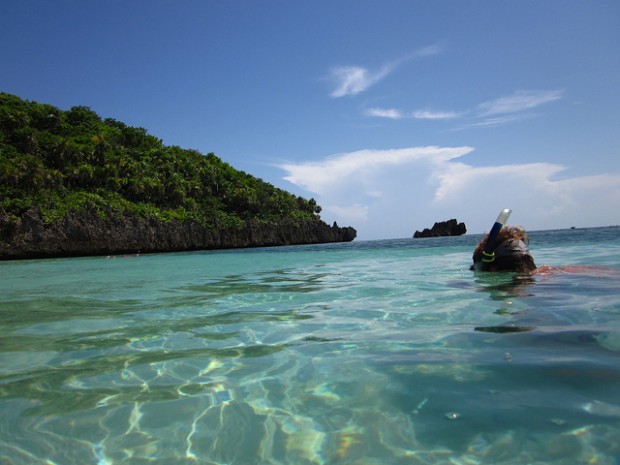
Photo Credit: Alex in Wanderland
3. Even make a few new aquatic friends.
Nature abounds in the Bay Islands; from ziplines to hands-on dolphin encounters, Roatan holds endless possibilities for making new friends.
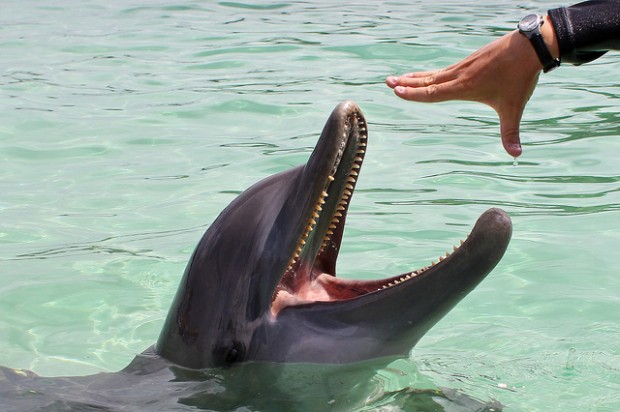
Photo Credit: Dolphin Encounter
4. You are encouraged to kick back and soak up the view.
Roatan is said to be where white sand meets clear, turquoise water on some of the world’s best beaches.
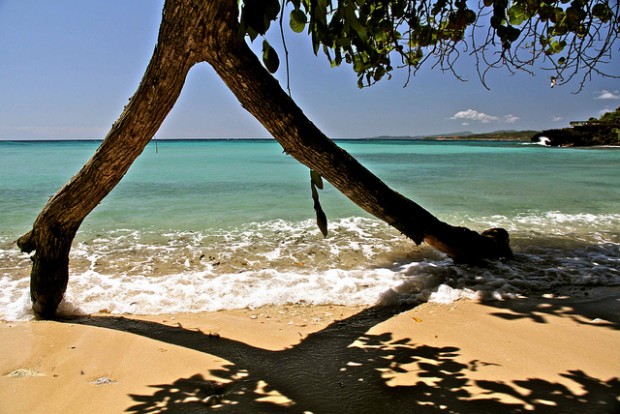
Photo Credit: P. Cheng
5. Without a doubt, life in Roatan might just be like an endless vacation.
Life is simpler and your needs are less. The price of U.S. goods is higher as you might expect on an island, but local goods are quite inexpensive and you will find they meet most of your needs.
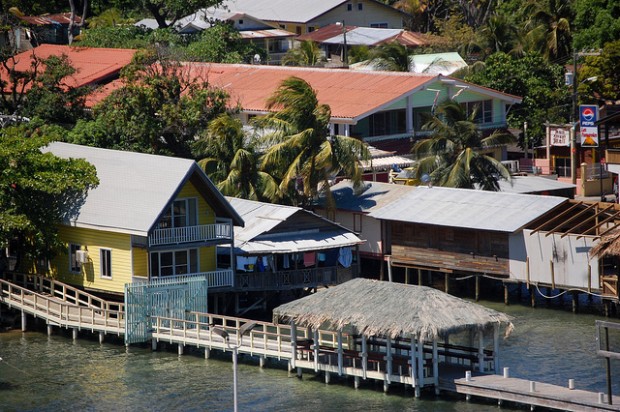
Photo Credit: P. Cheng
Have a favorite reason why you call Roatan home? Let us know!

Credit: Daniel Foster
It’s not surprising the Canadians fly south for a winter vacation, beating a path faster than the migrating geese. Canadian winters can reach some pretty teeth-chattering extremes, with dense snows in the mountainous regions and below-freezing winds rolling over the plains.
When Canadians fly south however, they want an adventure as rich in texture as they can receive in their own wildly beautiful and largely unpopulated country. They’ve found much of that delicious thrill by vacationing in Honduras. Charter flights since November of this year have increased 51% over the previous prime time season of November to April, last year.
The Attractiveness of Honduras
Honduras has some of the features Canadians enjoy: a few large population centers among vast stretches of wilderness areas, an indigenous culture, and a natural playground for outdoor enthusiasts. It also has some features the Canadian population doesn’t get to enjoy as part of their environment; ancient Mayan temples, incredible coral reefs, fresh tropical foods, and warm, shallow beaches. This gives them something to talk about when they go home.
It is a land that appeals to all social classes and lifestyles. It is possible to fly directly into many of the desirable locales, take a cruise ship, and spend your time in first class hotels. It is also very backpacker-friendly. In many areas of Honduras, all you have to do is back-pack in to a favorable, isolated spot, set up camp, and simply enjoy the beauty that surrounds you.
Honduras has something for everyone: the nature enthusiast, the anthropologist, beach lovers, scuba divers, kayakers, and those who simply like a good party.
Visa requirements are easy. You do not need a passport if you are a citizen of Canada, the United States, the United Kingdom, or Australia. The visa is good for up to ninety days, with the option of applying for an extension.
Currency Exchange
The most recommended way to travel in Honduras is to buy traveler’s checks and cash them at the banks. The exchange rate averages around five cents to a lempira. Always carry some of the Honduras currency in one hundred to two hundred lempira notes, for one or two days living expenses at a time. The lines at banks are often long, but it is the safest and most equitable exchange. ATM machines are often broken down or out of cash. Many stores and restaurants will accept dollars, but ask in advance.
Trujillo: The Humble Promise
Trujillo has a long history. In the Cuyamel caves, on the inland slopes of Mt. Capira and Mt. Calentura, evidence has been found of communities dating back to 1,200 to 6,000 B.C. It was the fourth and final stop Christopher Columbus made in his exploration of the Americas.

The modest beach town of 30,000 features an old Spanish fort on a bluff, with a row of cannons overlooking the spectacular bay.
You can live the high life in top-notch hotels that charge from $30 – $78 a night, or go local and secure a room for as cheaply as four dollars. Of course that will mean skipping the hot water. The various options include simply buying a straw mat and lounging out on the beach.
This banana coast town features a variety of things to do beyond basking in sun soaked sands and swimming in tranquil Caribbean water, or studying ancient history. The environment includes waterfalls, mountains, tropical forests and the Guaimoreto Lagoon Nature Reserve with a mangrove ecosystem and rare, tropical birds.
While the town of Trujillo is very poor, the government hopes to change this. It plans to turn Trujillo into a new, charter city, with a marina, shopping malls, and rail/ship and air transportation. It’s working energetically with foreign investors to give this quiet town by the sea a face lift, with the potential to employ hundreds of local, currently poverty-stricken workers.
Canadians Like Roatan
It’s difficult to hide a gem once it’s been discovered, and Roatan is no exception. The thirty-five mile long island nestles next to the largest barrier reef in the Caribbean and is the second largest reef system in the world. Canadians love taking their vacations in Roatan for several reasons.

There are resorts where you can stay at the west end of the island, but as you begin traveling east, development becomes more sparse, allowing you the option of privacy and mingling with the locals.
Scuba diving is the number one sport, but there is also snorkeling, kayaking, and deep sea fishing. Sandy Bay features mini-golf and there is a horseback riding ranch at the West End.
There is a road system, but many of the roads are unpaved. Traveling from one end of the island to the other can take more than an hour, but you can always take a boat or paddle your own canoe.
You can reach the island by boat or charter plane. Once there, you can even take a helicopter cruise to enjoy the highlights of the fantastic coral reefs and beautiful, largely untouched scenery Roatan has to offer.
A word of warning to beach campers. You can set your travel bag down anywhere on the beach and enjoy an exclusive, private setting. However, when the cruise ships come in, for a short while, you may find your isolated spot invaded with tourists jostling for a place in the sun, and the prices of food and drink suddenly doubling and tripling. Wait a couple of days and this will change, sending you back to that dream vacation of throwing away the clock and just listening to the sighs and murmurs of nature.
When You Can’t Get Enough of That Coral
The most avid seekers of that unique place to go, seek out the small island of Utila. In the middle of coral paradise, it’s also the thrill of a lifetime for the avid scuba diver. With over sixty scuba diving locations to choose from, you’re not only entering a landscape of fragile coral painting the underwater world with pastel cities, and brilliantly colored fish darting about their rainbow hued habitat, but dark, mysterious caves and the ghostly wrecks of sunken vessels.

Some divers have reported seeing the Whale Shark. Although a behemoth in size as the world’s largest fish, its gentle life is invested in zooplankton, snapper eggs and small, shrimp eating fish.
The population is small; only about 2,500 year round inhabitants; and tourism fairly light. As the closest island to the mainland port of La Caiba, it is easy to reach by boat, ferry or small plane. There are no national chain hotels or restaurants in Utila, but the hometown flavor of the locally owned businesses only add to the cultural charm.
The Fabulous Bay
Trujillo, Roatan and Utila are all within a short distance of each other, with Trujillo on the mainland, and Roatan and Utila within the Bay Islands. The white sand beaches and gentle blue waters make the area the perfect escape from crowded resorts and roaring traffic. You can even rent an entire small island to yourself for approximately $130 a night.
For the outdoor enthusiast, there is little it doesn’t have to offer except snow-boarding and ice sculptures, but give the innovative thinkers of Honduras a little time, and they’re sure to think of a solution for that, as well.
Canadians like to go where the adventure is as great as in their homeland. The Bay Islands never fail to satisfy that adventurous, pioneering spirit, while offering all the quiet, crystal beauty of the Caribbean Sea, as well.


















